Do you think there is room for optimizations in the function haswon (see below)?
I recognized that changing the argument type from __int64 to unsigned __int64 made the function faster, thus i thougt maybe there is still a chance for optimization.
In more detail: I am writing a connect four game. Recently i used the Profiler Very Sleepy and recognized that the function haswon uses much of the cpu-time. The function uses a bitboard-representation of the connect-four-board for one player. The function itself i found in the sources of the fourstones benchmark. The bitboard representation is following:
. . . . . . . TOP
5 12 19 26 33 40 47
4 11 18 25 32 39 46
3 10 17 24 31 38 45
2 9 16 23 30 37 44
1 8 15 22 29 36 43
0 7 14 21 28 35 42 BOTTOM
The function:
// return whether newboard includes a win
bool haswon(unsigned __int64 newboard)
{
unsigned __int64 y = newboard & (newboard >> 6);
if (y & (y >> 2 * 6)) // check \ diagonal
return true;
y = newboard & (newboard >> 7);
if (y & (y >> 2 * 7)) // check horizontal -
return true;
y = newboard & (newboard >> 8);
if (y & (y >> 2 * 8)) // check / diagonal
return true;
y = newboard & (newboard >> 1);
if (y & (y >> 2)) // check vertical |
return true;
return false;
}
Thanks!
Edit: CPU is x86, 32 Bit Architecture, i'm using the Compiler from the Visual Studio 2008 Express Edition. Optimization Flags are /O2 /Oi /GL.
I tried the function haswon2 which Ben Jackson suggested. The assemblies from the Microsoft Compiler, with the default optimization flags for release versions (/O2 /Oi /GL), showing nearly no runtime differences. It looks like that the VC-Compiler in comparison to gcc can not take advantage that it must not evaluate each condition in strict order.
Results:
haswon original:

haswon2 from Ben Jackson:

Edit2: Assembly of haswon:
00401A10 mov eax,dword ptr [esp+4]
00401A14 mov ecx,dword ptr [esp+8]
00401A18 push ebx
00401A19 push esi
00401A1A push edi
00401A1B mov edx,eax
00401A1D mov edi,ecx
00401A1F shrd edx,edi,6
00401A23 mov esi,edx
00401A25 shr edi,6
00401A28 and esi,eax
00401A2A and edi,ecx
00401A2C mov edx,esi
00401A2E mov ebx,edi
00401A30 shrd edx,ebx,0Ch
00401A34 shr ebx,0Ch
00401A37 and edx,esi
00401A39 and ebx,edi
00401A3B or edx,ebx
00401A3D je `anonymous namespace'::haswon+35h (401A45h)
00401A3F mov al,1
00401A41 pop edi
00401A42 pop esi
00401A43 pop ebx
00401A44 ret
00401A45 mov edx,eax
00401A47 mov edi,ecx
00401A49 shrd edx,edi,7
00401A4D mov esi,edx
00401A4F shr edi,7
00401A52 and esi,eax
00401A54 and edi,ecx
00401A56 mov edx,esi
00401A58 mov ebx,edi
00401A5A shrd edx,ebx,0Eh
00401A5E shr ebx,0Eh
00401A61 and edx,esi
00401A63 and ebx,edi
00401A65 or edx,ebx
00401A67 jne `anonymous namespace'::haswon+2Fh (401A3Fh)
00401A69 mov edx,eax
00401A6B mov edi,ecx
00401A6D shrd edx,edi,8
00401A71 mov esi,edx
00401A73 shr edi,8
00401A76 and esi,eax
00401A78 and edi,ecx
00401A7A mov edx,esi
00401A7C mov ebx,edi
00401A7E shrd edx,ebx,10h
00401A82 shr ebx,10h
00401A85 and edx,esi
00401A87 and ebx,edi
00401A89 or edx,ebx
00401A8B jne `anonymous namespace'::haswon+2Fh (401A3Fh)
00401A8D mov edx,eax
00401A8F mov esi,ecx
00401A91 shrd edx,esi,1
00401A95 shr esi,1
00401A97 and esi,ecx
00401A99 and edx,eax
00401A9B mov eax,edx
00401A9D mov ecx,esi
00401A9F shrd eax,ecx,2
00401AA3 shr ecx,2
00401AA6 and eax,edx
00401AA8 and ecx,esi
00401AAA or eax,ecx
00401AAC jne `anonymous namespace'::haswon+2Fh (401A3Fh)
00401AAE pop edi
00401AAF pop esi
00401AB0 xor al,al
00401AB2 pop ebx
00401AB3 ret